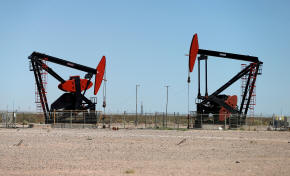|
Brent crude futures for September settlement, due to expire on
Friday, gained $2.34 to $109.48 a barrel by 0933 GMT for its
highest since July 5. The more active October contract was up
$2.30 at $104.13.
U.S. West Texas Intermediate (WTI) crude futures rose $2.16 to
$98.58 a barrel.
Both contracts are set for a second monthly loss, however, down
4.6% and 6.8%, respectively.
A weaker dollar and stronger equities also lent support on
Friday. A fall in the dollar makes oil cheaper for buyers with
other currencies.
Global equities, which often move in tandem with oil prices,
were up on the hope that U.S. monetary tightening would not be
as hawkish as initially expected after disappointing growth
figures. [MKTS/GLOB]
"It certainly feels like we are back in trade-off mode again,
where sentiment is shifting between recessionary risks in H2 and
a fundamentally undersupplied (oil) market," said Stephen Innes,
managing partner at SPI Asset Management.
Front-month Brent futures are selling at a rising premium to
later-loading months, a market structure known as backwardation,
indicating tight current supply.
"The oil market in Europe is considerably tighter than in the
U.S., which is also reflected in the sharply falling Brent
forward curve," said Commerzbank analyst Carsten Fritsch.
A key driver will be the next meeting of the Organization of the
Petroleum Exporting Countries (OPEC) and allies led by Russia,
together known as OPEC+, on Aug. 3.
OPEC+ sources said the group will consider keeping oil output
unchanged for September, with two OPEC+ sources saying a modest
increase would be discussed.
A decision not to raise output would disappoint the United
States after U.S. President Joe Biden visited Saudi Arabia this
month hoping to strike a deal to open the taps.
Analysts, however, said it would be difficult for OPEC+ to boost
supply, given that many producers are already struggling to meet
production quotas.
(Reporting by Shadia Nasralla; Additional reporting by Sonali
Paul in Melbourne and Jeslyn Lerh in Singapore; Editing by David
Goodman)
[© 2022 Thomson Reuters. All rights
reserved.]
This material may not be published,
broadcast, rewritten or redistributed.
Thompson Reuters is solely responsible for this content.

|
|





